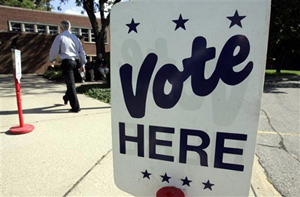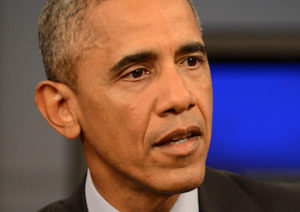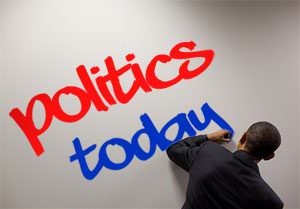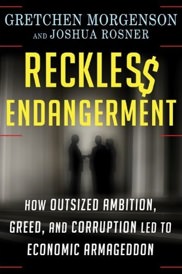Bracing for the Ballot Battle
Next Tuesday, don’t be shocked if the Republicans roll out their familiar tactics of intimidating Democratic voters, challenging their eligibility and subjecting them to long lines at polling places. If the election is close, these shady maneuvers might pay off.
Next Tuesday, don’t be shocked if the Republicans roll out their familiar tactics of intimidating Democratic voters, challenging their eligibility and subjecting them to long lines at polling places. If the election is close, these shady maneuvers might pay off.
None of this will matter if Sen. Barack Obama wins big. But if the polls are misleading or just plain wrong, the outcome may depend on what happens in courtrooms, or with the late, and possibly questionable, counting of provisional ballots cast by voters who have been challenged.
In addition, a tangle of incompetent and partisan local election officials, failure-prone technology and complex, obscure election laws will prompt polling-place disputes and litigation in some key states.
An excellent summation of potential problems is provided by the Pew Center on the States report “Election Preview 2008: What if We Had an Election and Everyone Came?”
The Pew report is much more restrained than my view of the situation. Nonprofits have to give the impression of impartiality. But from the report and a summary of it by Erica L. Green in Medill Reports Washington, it’s easy to figure out where the Democrats should expect election night troubles. News stories and blogging election experts provided me with additional information.
The Pew report pointed out the dangers of provisional ballots. Voters must cast provisional ballots if they don’t have photo identification, when their name doesn’t appear on the voter rolls and, most important, when they are challenged by a political party poll watcher. The provisional ballots are counted later, after a voter proves to an official that he or she is authentic.
Republicans are warming up for such challenges, although Democrats will make them too. The Pew study quoted Tova Wang of Common Cause and Edward Foley of Ohio State University’s Moritz College of Law as warning that provisional ballots, and the variety of state rules that govern them, may be the hanging chad of 2008. Hanging chads on punch-out ballots were the symbol of the Democratic loss of the presidency in 2000.
And aside from partisan warfare, there are the technological failures that have marred past elections. Doubts still linger about electronic voting machines. The Pew study said: “The U.S. Election Assistance Commission (EAC) reported that it would not be able to certify some voting systems by the November election, so leading manufacturers and election officials say they are forgoing important software modifications meant to address security and performance concerns.”
The biggest danger to a fair count, however, comes from experienced Republicans who perfected their assaults on the electoral system in Florida in 2000 and Ohio in 2004.
There are signs of such activity in the battleground states where the election is close. In Florida, where Obama leads Sen. John McCain 47.8 percent to 45.1 percent in a Pollster.com summary of surveys, Democrats are bracing for many challenges in Democratic areas. Democrats could file challenges, too, since Florida law, changed since 2004, now makes it easier to lodge such challenges. As the Miami Herald reported, “For provisional ballots to count, voters would have to prove their residency to local election officials by 5 p.m. Nov. 6 — two days after the Nov. 4 election. The counting of high numbers of provisional ballots could hang up Florida’s presidential election tally until the third day if the outcome is as razor-thin as it was in 2000 — the mother of all election recounts.” In addition, Florida is using its third new voting technology in the third presidential election in a row.
In Ohio, where Obama leads McCain 49.7 percent to 43.4 percent in the Pollster.com summary, the Republicans have sought to disqualify 200,000 newly registered potential Democratic voters.
In Indiana, with McCain leading 47.5 percent to Obama’s 46.4 percent, voters will have to present photo identification for the first time, a requirement Republicans have used in the past to challenge Democrats in poor minority areas. In addition, Indiana Republicans are seeking to close down early voting centers in Gary, Hammond and East Chicago, threatening Democratic hopes to carry the state.
Some of the other battleground states that could be in dispute on Election Day are Nevada, New Mexico, Colorado, Missouri, Pennsylvania and Georgia.
Long before Obama and McCain began their fall campaign, Republicans moved to block an extensive voter registration drive that had its roots in the unions, new organizations spawned by the Internet and by veteran grass-roots organizations, including ACORN, the Association of Community Organizations for Reform Now.
ACORN’s effective registration drive had been a Republican target in 2004. Some of the U.S. attorneys fired in last year’s Justice Department scandal were targeted after the election because they didn’t prosecute the organization for voter fraud that did not exist. All through this year, the Republicans have gone after ACORN, and the theme has become a staple of the McCain-Palin campaign.
Now, with the election just days away, the Republicans will take to the field with renewed energy, hoping to win through intimidation and legal processes a victory that they are finding difficult to attain in the voting booths.
Your support matters…Independent journalism is under threat and overshadowed by heavily funded mainstream media.
You can help level the playing field. Become a member.
Your tax-deductible contribution keeps us digging beneath the headlines to give you thought-provoking, investigative reporting and analysis that unearths what's really happening- without compromise.
Give today to support our courageous, independent journalists.








You need to be a supporter to comment.
There are currently no responses to this article.
Be the first to respond.